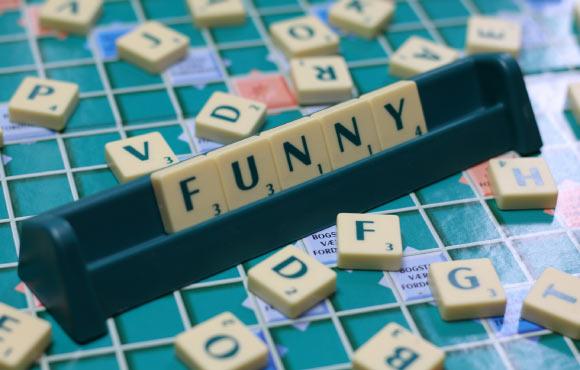A new study by University of Alberta scientists demonstrates that words are judged funnier if they are less common and have an improbable orthographic or phonological structure. According to the study, the top 10 funniest words in the English language are upchuck, bubby, boff, wriggly, yaps, giggle, cooch, guffaw, puffball, and jiggly.

Westbury & Hollis determined that there are two main kinds of predictors of funniness in words: those related to the form of the word and those related to its meaning. Image credit: Jesper Sehested, PlusLexia.com / CC BY 2.0.
“Humor is, of course, still personal. Here, we get at the elements of humor that aren’t personal; things that are universally funny,” said University of Alberta’s Professor Chris Westbury.
The purpose of the study was to understand just what it is about certain words that makes them funny.
Professor Westbury and his colleague, Dr. Geoff Hollis, analyzed humor ratings collected for 4,997 English words.
The findings show there are two types of funniness predictors: form predictors and semantic predictors.
Form predictors have nothing to do with the meaning of the word, but rather measure elements such as length, letter and sound probabilities, and how similar the word is to other words in sound and writing.
For example, the study found that the letter k and the sound ‘oo’ (as in ‘boot’) are significantly more likely to occur in funny words than in words that are not funny.
Semantic predictors were taken from a computational model of language and measure how related each word is to different emotions, as well as to six categories of funny words: sex, bodily functions, insults, swear words, partying, and animals.
“We started out by identifying these six categories,” Professor Westbury said.
“It turns out that the best predictor of funniness is not distance from one of those six categories, but rather average distance from all six categories.”
“This makes sense, because lots of words that people find funny fall into more than one category, like sex and bodily functions — like boobs.”
The findings appear in the Journal of Experimental Psychology: General.
_____
Chris Westbury & Geoff Hollis. Wriggly, squiffy, lummox, and boobs: What makes some words funny? Journal of Experimental Psychology: General, published online October 18, 2018; doi: 10.1037/xge0000467







